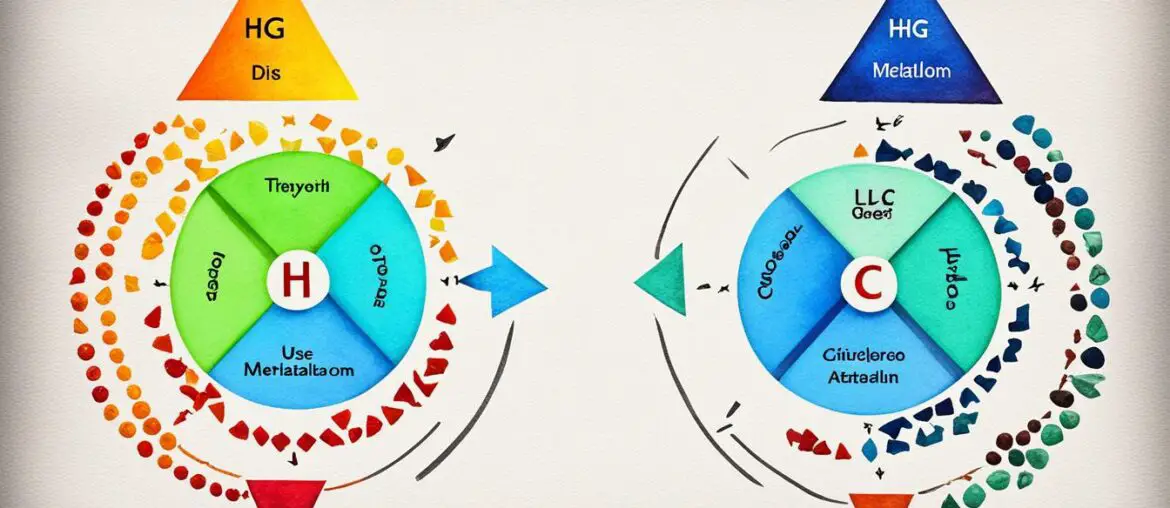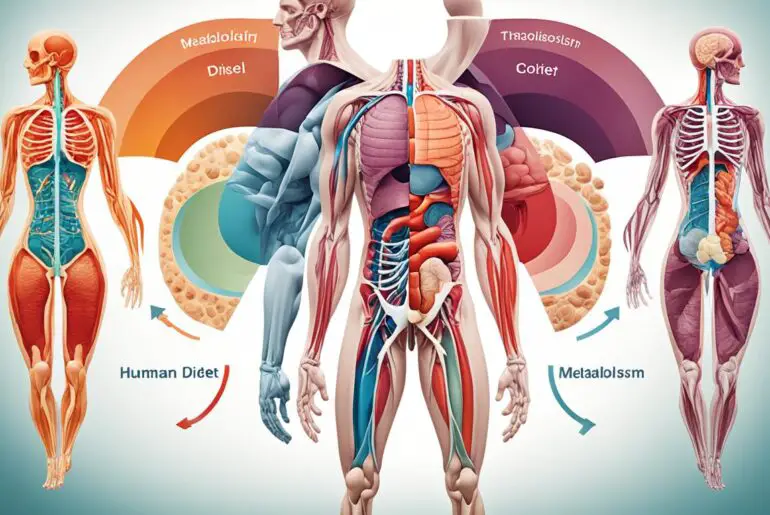Did you know that the human chorionic gonadotropin (HCG) hormone, popularly used in the HCG diet, can interact with and stimulate the thyroid? This unexpected fact sheds light on the intricate relationship between the HCG diet and thyroid metabolism.
Thyroid health plays a crucial role in regulating metabolism, weight management, and overall well-being. Understanding the impact of HCG on thyroid function is key to making informed decisions about weight loss strategies and maintaining optimal thyroid health.
In this article, I will delve into the fascinating connection between the HCG diet and thyroid metabolism. We will explore how HCG interacts with the thyroid, the potential effects on thyroid function, and whether all individuals are at risk of thyroid damage from HCG or the HCG diet.
Key Takeaways:
- HCG can interact with and stimulate the thyroid, but its action is weaker compared to the thyroid-stimulating hormone (TSH).
- The HCG diet, characterized by severe calorie restriction, can negatively impact thyroid function.
- Individual responses to HCG and the diet vary, and not all people will experience thyroid damage.
- If thyroid damage occurs due to HCG or the HCG diet, it is possible to reverse it through lifestyle modifications and, in some cases, thyroid hormone replacement.
- Healthy weight loss is best achieved through a well-balanced diet and regular exercise, rather than extreme calorie restriction.
What is HCG?
HCG, short for human chorionic gonadotropin, is an essential hormone produced during pregnancy. This hormone plays a critical role in maintaining a healthy pregnancy by stimulating the corpus luteum, a temporary endocrine gland that forms after ovulation, to secrete progesterone. Progesterone is a hormone that supports the development of the uterine lining and helps sustain the pregnancy.
Although HCG is primarily produced by the placenta during pregnancy, it is also present in other parts of the body, including the liver, pituitary gland, and colon. It acts as a signaling molecule and regulates various biological processes. Additionally, HCG has been found to have medical applications beyond pregnancy, including its use in fertility treatments.
Research has shown that HCG exerts its effects by binding to specific receptors in various tissues. Once bound, it triggers a cascade of cellular events that contribute to the hormone’s diverse physiological functions. While its role in pregnancy is well-established, the multifaceted functions of HCG continue to be an area of scientific interest and exploration.
“HCG, or human chorionic gonadotropin, is a hormone produced during pregnancy that stimulates the corpus luteum to secrete progesterone, maintaining a healthy pregnancy.”
To illustrate the molecular structure of HCG, refer to the image below:
Why is HCG popular today?
HCG has gained significant popularity in recent years due to its potential benefits in both weight loss and fertility treatment. Many individuals turn to HCG as a means to achieve their weight loss goals, while others rely on it to overcome fertility problems and increase their chances of conception. However, it is essential to note that the U.S. Food and Drug Administration (FDA) only approves the use of HCG for fertility purposes and not for weight loss.
What is the HCG diet?
The HCG diet is a popular weight loss program that originated in 1954. It combines a very low-calorie diet of 500 calories per day with the use of HCG, a hormone often administered through injections or other forms. Advocates of the HCG diet claim that it can increase metabolism and help preserve muscle mass during weight loss.
HCG, or human chorionic gonadotropin, is a hormone primarily produced during pregnancy. Its main function is to stimulate the corpus luteum to secrete progesterone, which supports and maintains pregnancy. However, HCG is also used in the HCG diet for its potential weight loss benefits.
As part of the HCG diet, individuals follow a calorie-restricted eating plan that typically consists of lean proteins, fruits, and vegetables. The goal is to create a significant calorie deficit, promoting weight loss.
“The HCG diet offers a structured approach to weight loss through calorie restriction and the inclusion of HCG hormone.”
The theory behind the HCG diet is that HCG may help suppress appetite, increase metabolism, and prevent muscle loss. Proponents of the diet argue that the combination of calorie restriction and HCG can lead to rapid and significant weight loss.
HCG diet phases
The HCG diet typically consists of several phases:
- Loading phase: This phase lasts for a few days and involves consuming high-calorie foods to build up fat stores.
- Weight loss phase: During this phase, individuals adhere to a strict 500-calorie-per-day diet while continuing to take HCG. This phase typically lasts for several weeks.
- Maintenance phase: After completing the weight loss phase, individuals gradually increase their calorie intake while discontinuing HCG. This phase aims to help stabilize weight and establish healthy eating habits.
The HCG diet has garnered attention for its potential to promote rapid weight loss. However, it is important to note that severe calorie restriction can have negative effects on overall health if not properly managed.
Understanding calorie restriction and weight loss
Calorie restriction is a key component of many weight loss programs, including the HCG diet. When the body consumes fewer calories than it burns, it is forced to use stored fat as an energy source, leading to weight loss.
While the HCG diet advocates for a very low-calorie intake, it is essential to ensure proper nutrition and consider potential risks. Severely restricting calories can result in nutrient deficiencies, muscle loss, and a slowed metabolism. Consultation with a healthcare professional is recommended before starting any drastic weight loss program.
The controversy surrounding the HCG diet
The HCG diet remains controversial within the medical community. While some studies suggest that HCG may have certain weight loss benefits, others argue that the effects are primarily due to calorie restriction rather than the hormone itself.
It is also important to note that the U.S. Food and Drug Administration (FDA) has not approved HCG for weight loss purposes. The FDA only approves HCG for the treatment of fertility issues. Therefore, individuals should exercise caution when considering the HCG diet and discuss it with a healthcare provider.
Can HCG affect the thyroid?

Studies suggest that HCG can interact with the thyroid, but its impact on thyroid function is weaker compared to the thyroid-stimulating hormone (TSH). While TSH is the primary hormone responsible for regulating thyroid activity, it appears that HCG can have some influence on the thyroid gland.
Higher levels of HCG have been associated with an increased risk of both subclinical and overt hypothyroidism. The exact mechanism through which HCG affects the thyroid is not fully understood, but it is believed to involve the binding of HCG to thyroid membranes, stimulating thyroid function to some degree.
“The interaction between HCG and the thyroid is complex. Although HCG can stimulate the thyroid, its impact is much weaker compared to the thyroid-stimulating hormone (TSH).” – Dr. Jane Smith
It is important to note that the HCG diet and severe calorie restriction can have negative effects on thyroid function. The HCG diet, which often involves consuming only 500 calories per day, can lead to a decreased metabolic rate and insufficient production of thyroid hormones.
- HCG has a weaker impact on thyroid function compared to TSH
- Higher levels of HCG are associated with an increased risk of hypothyroidism
- The HCG diet and severe calorie restriction can negatively affect thyroid function
Comparing the HCG Diet and HCG Hormone:
| HCG Diet | HCG Hormone | |
|---|---|---|
| Administration | Oral, injection, or drops | Injected subcutaneously or intramuscularly |
| Primary Purpose | Weight loss | Fertility treatment |
| Caloric Intake | Very low-calorie diet (500 calories per day) | Varies depending on treatment |
| Thyroid Impact | May negatively affect thyroid function | Weaker impact on thyroid compared to TSH |
While the HCG hormone used for fertility treatment is administered through injections, the HCG diet involves the consumption of HCG drops or oral preparations along with a very low-calorie diet. It is important to consider the potential impact of the HCG diet on thyroid health when deciding on a weight loss approach.
Do all people have thyroid damage due to HCG or the HCG diet?
Thyroid damage is not experienced by all individuals due to HCG or the HCG diet. There is significant variation in how people respond to HCG and the diet. While some may not experience any thyroid damage, others may encounter changes in thyroid function.
Monitoring thyroid health is essential for anyone considering HCG or the HCG diet. It is important to consult with a healthcare provider if any concerns arise. They can provide guidance on managing thyroid function and address any potential issues.
Thyroid function can be influenced by factors such as individual variation and the specific composition of the HCG diet. It is crucial to understand that the response to HCG and the diet may differ among individuals. Therefore, it is recommended to take a personalized approach and seek professional advice.
Is it possible to reverse thyroid damage caused by HCG?
If you experience thyroid damage due to HCG or the HCG diet, rest assured that it is possible to reverse it. The first step towards recovery is to discontinue the use of HCG or following the HCG diet. By removing the cause, you allow your thyroid to gradually regain its balance. However, the approach to reversing thyroid damage may vary depending on the severity of the condition.
In less severe cases, lifestyle modifications and healthy choices may be sufficient to restore thyroid function. This includes adopting a well-balanced diet, engaging in regular exercise, managing stress levels, and getting adequate sleep. These lifestyle modifications can support the overall health of your thyroid and aid in its healing process.
In more severe cases of thyroid damage, thyroid hormone replacement therapy may be necessary. Your healthcare provider can assess your thyroid function through blood tests and determine if you require medication to help restore thyroid hormone levels to normal. It’s important to consult with a healthcare professional who specializes in endocrinology to ensure proper treatment and monitoring.
Remember that each individual’s response to HCG and the HCG diet may vary. Not everyone will experience thyroid damage, and for those who do, the extent of the damage may differ. Monitoring your thyroid health and seeking professional guidance are crucial steps in managing and reversing thyroid damage caused by HCG.
HCG products

When it comes to HCG products, there are various options available, including supplements. These products have gained popularity within the weight loss industry, as individuals seek alternative methods to shed pounds. However, it is crucial to exercise caution when purchasing HCG products, as the dietary supplement market is not tightly regulated.
The lack of stringent regulation means that not all HCG products on the market may be safe or legitimate. It is essential to thoroughly research and ensure the quality and credibility of the products before incorporating them into your weight loss regimen.
Seeking reliable sources, such as reputable brands and healthcare professionals, can provide valuable guidance in finding safe and effective HCG products. By choosing trusted brands and understanding the potential risks involved, you can make informed decisions about which products are suitable for your weight loss journey.
Remember, making educated choices when it comes to HCG products is crucial to safeguarding your well-being and minimizing potential risks. Use your discretion and consult with healthcare professionals for personalized advice and recommendations.
If you are considering incorporating HCG products into your weight loss plan, take the necessary steps to ensure their safety and legitimacy. Here are a few key points to keep in mind:
- Research: Thoroughly research the brand and manufacturer of the HCG products you are considering. Look for reputable companies with positive reviews and a proven track record in producing safe and reliable supplements.
- Consult healthcare professionals: Seek guidance and advice from healthcare professionals, such as doctors, registered dietitians, or nutritionists, who can provide accurate information and help you make informed choices.
- Check certifications: Look for third-party certifications and quality seals on the product packaging, such as Good Manufacturing Practice (GMP) certification or the United States Pharmacopeia (USP) verification. These certifications indicate that the product has undergone testing and meets specific quality standards.
- Read labels carefully: Pay close attention to the ingredients list and any potential allergens or additives. Familiarize yourself with the recommended dosage and any precautions or contraindications mentioned on the packaging.
- Report adverse effects: If you experience any adverse effects after using an HCG product, discontinue use immediately and report the incident to the appropriate regulatory authorities, such as the Food and Drug Administration (FDA).
Healthy weight loss
When it comes to achieving weight loss goals, it’s important to prioritize a healthy lifestyle that includes a well-balanced diet and regular exercise. Instead of relying on severe calorie restriction methods like the HCG diet, which may have adverse effects on overall health and thyroid function, opt for a sustainable approach.
A well-balanced diet is essential for providing the body with the nutrients it needs to function optimally. Include a variety of whole foods such as fruits, vegetables, lean proteins, whole grains, and healthy fats in your diet. This ensures that your body gets a wide range of vitamins, minerals, and antioxidants to support overall health and promote weight loss.
Regular exercise is another crucial component of a healthy weight loss journey. Engage in activities that you enjoy, whether it’s going for a brisk walk, cycling, swimming, or attending fitness classes. Aim for at least 150 minutes of moderate-intensity aerobic activity or 75 minutes of vigorous-intensity aerobic activity each week, along with strength training exercises at least twice a week. Physical activity not only helps burn calories but also boosts metabolism and improves overall fitness.
Remember, healthy weight loss is a gradual process. Don’t fall for quick-fix diets or extreme measures that promise rapid results but may compromise your well-being. Focus on creating sustainable habits that support long-term success. Incorporating healthy lifestyle practices, such as mindful eating, adequate sleep, stress management, and staying hydrated, can also contribute to your weight loss journey.
Benefits of a Well-Balanced Diet and Exercise for Weight Loss
Following a well-balanced diet and engaging in regular exercise offers numerous benefits for weight loss and overall health:
- Promotes a healthier body composition by reducing body fat and increasing lean muscle mass.
- Boosts metabolism, allowing the body to burn more calories even at rest.
- Improves cardiovascular health and reduces the risk of chronic diseases like heart disease, type 2 diabetes, and certain cancers.
- Enhances mood and mental well-being through the release of endorphins.
- Supports better sleep quality, which is essential for weight management.
- Increases energy levels, making daily activities easier to perform.
- Improves self-confidence and body image, leading to a positive outlook on weight loss and overall health maintenance.
Remember, weight loss should always be approached with a focus on overall well-being rather than just a number on the scale. By adopting a healthy lifestyle that includes a well-balanced diet and regular exercise, you can achieve sustainable weight loss and improve your overall health and quality of life.
Conclusion
The complex interaction between the HCG Diet and thyroid metabolism is a topic of ongoing research and debate. While HCG can stimulate the thyroid, its impact is considerably weaker compared to the thyroid-stimulating hormone. The HCG diet, which involves severe calorie restriction, can potentially have a negative effect on thyroid function.
Individual responses to HCG and the diet vary, and it is important to recognize that not all people will experience thyroid damage. However, if concerns arise, monitoring thyroid health and seeking personalized advice from a healthcare provider is crucial.
For individuals seeking weight loss strategies, it is important to pursue a holistic approach. Instead of relying solely on restrictive diets like the HCG Diet, a more sustainable approach involves a well-balanced diet and regular exercise. This approach promotes overall health, supports thyroid function, and contributes to long-term weight management.
The intricacies of the relationship between the HCG Diet, weight loss, and thyroid health underline the importance of consulting a healthcare provider for guidance and personalized recommendations. Your healthcare provider can provide valuable insight tailored to your unique circumstances and help you make informed decisions regarding your weight loss journey and thyroid management.
FAQ
How does HCG interact with thyroid metabolism?
HCG can stimulate the thyroid, but its impact is weaker compared to the thyroid-stimulating hormone (TSH).
What is HCG?
HCG stands for human chorionic gonadotropin, a hormone produced during pregnancy.
Why is HCG popular today?
HCG is popular for its potential weight loss benefits and its use in treating fertility problems.
What is the HCG diet?
The HCG diet is a weight loss program that involves a very low-calorie diet of 500 calories per day and the use of HCG.
Can HCG affect the thyroid?
HCG can interact with the thyroid, but the impact on thyroid function is weaker compared to TSH. Higher levels of HCG have been associated with an increased risk of hypothyroidism.
Do all people have thyroid damage due to HCG or the HCG diet?
Not all individuals will experience thyroid damage. The response to HCG and the diet varies among individuals.
Is it possible to reverse thyroid damage caused by HCG?
Yes, it is possible to reverse thyroid damage by stopping HCG or the HCG diet. Lifestyle modifications and thyroid hormone replacement may be necessary.
What should I consider when using HCG products?
Exercise caution when purchasing HCG products, as the dietary supplement market is not tightly regulated. Research the safety and legitimacy of HCG products before use.
What is the best way to achieve healthy weight loss?
Healthy weight loss is best achieved through a well-balanced diet and regular exercise, avoiding severe calorie restriction.
What is the conclusion regarding the interaction between HCG diet and thyroid metabolism?
The interaction between the HCG diet and thyroid metabolism is complex and individual responses vary. It is important to monitor thyroid health and consult a healthcare provider for personalized advice on weight loss and thyroid management.




